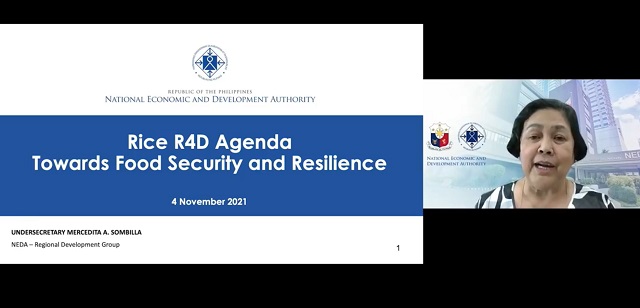
Rice stakeholders need to collaborate to develop game-changing strategies for the rice sector in the new normal.
Dr. Mercedita A. Sombilla, undersecretary for regional development of the National Economic and Development Authority (NEDA), stressed this in her speech during the Ugnay Palay: 33rd National Rice R4D e-conference, hosted by the Department of Agriculture-Philippine Rice Research Institute (DA-PhilRice), Nov. 4-5.
“As the government continues to develop strategies in the rice industry and put in place necessary policy reforms, we need assistance from our rice science experts who relentlessly provide sound policy recommendations to the decision makers. Collaboration among rice stakeholders is likewise important in this endeavor, particularly in implementing our development plans,” she said.
She added that the rice sector is facing many challenges, especially amid the pandemic.
“The sector remains vulnerable to the impacts of climate change. We [also] have yet to overcome the long-standing issues that continue to hamper agricultural productivity such as low adoption of new and better technologies and the lack of machinery and post-harvest facilities,” she elaborated.
She said that another challenge is effectively linking research for development (R4D) to policy formulation exercises and development planning, which will be implemented on the ground.
In project implementation, Dr Rex L. Navarro, technical expert in agricultural extension, said that the provincial local government units (LGUs) play a very important role.
“The [provincial LGUs] are the best implementation units because they know the situation of farmers in their locality better,” Navarro said.
To empower provincial LGUs, the DA is transitioning to the Province-led Agriculture and Fisheries Extension Systems (PAFES) – a strategy where provinces will serve as extension hubs that synchronize agricultural plans and programs.
DA said that efforts to strengthen the delivery of extension services to farmers are also in anticipation of the Mandanas-Garcia ruling set to take effect in Jan. 2022, which will give LGUs a bigger share from national taxes.
Sombilla is optimistic that with collaboration, challenges will fuel the sector’s pursuit to build back better and make agriculture more resilient in the future.
“[With effective extension systems] and through science and research, we can achieve our medium-term objectives embedded in the Philippine Development Plan 2017-2022 and the long-term vision of Matatag, Maginhawa, at Panatag na buhay in 2040,” she said.
The National R4D e-conference is one of the activities during DA-PhilRice’s 36th anniversary, Nov. 3-5.




